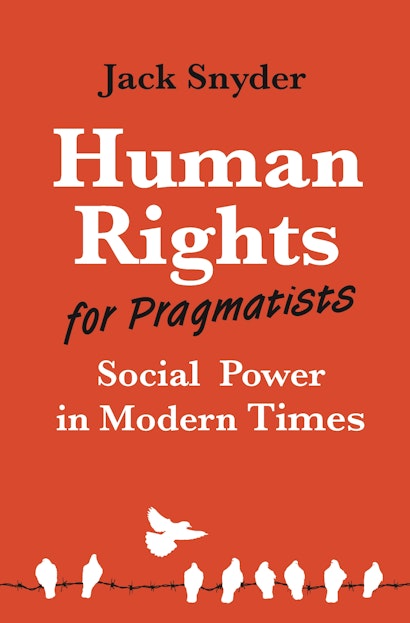Social Power in Modern Times
by Jack Snyder, Princeton University Press, July 2022
ISBN:9780691231549
 Reviewed by G. John Ikenberry in Foreign Affairs, New York, posted December 25, 2023
Reviewed by G. John Ikenberry in Foreign Affairs, New York, posted December 25, 2023
“In this excellent study of human rights activism, Snyder emerges as a practical-minded champion of liberalism, urging human rights advocates to concentrate on popular appeals and democratic politics. Displaying an impressive mastery of more than two centuries of world politics, Human Rights for Pragmatists is smart, provocative, and powerful. This is a fresh and challenging contribution to some of the biggest debates about democracy’s fate in an era of rising populist authoritarianism.”—Gary Bass, author of The Blood Telegram: Nixon, Kissinger, and a Forgotten Genocide
“Human Rights for Pragmatists is an important political primer for any advocate of the movement. This must-read comes at a critical juncture to remind us why victories for rights are not only matters of principle, but also of power and self-interest.”—Emilie Hafner-Burton, author of Making Human Rights a Reality
“Jack Snyder aims to be pragmatic, building a bridge between power and law. Through Human Rights for Pragmatists, he connects scholars from different disciplines and opens a debate that should be extended.”—Luis Moreno Ocampo, former chief prosecutor of the International Criminal Court
“For too long, we have lacked a serious historical sociology of human rights, one that locates the development and political purchase of such rights in the history of modernity and the evolution of the modern state. Human Rights for Pragmatists fills this gap, transforming our understanding of when struggles for rights succeed and how their victories are preserved. Concerned that dominant approaches to human rights promotion have lost sight of the social foundations of political success, Snyder emphasizes the critical importance of prevailing modes of social organization, rights supporting social coalitions, effective and durable implementing institutions, and locally resonant ideologies. Building on this theoretically and historically informed analysis, Snyder offers a sobering diagnosis of problems with current struggles for human rights. He matches this, however, with a powerful argument about how to reground and reorient such struggles, one that connects the politics of rights with the rejuvenation of social welfare democracy. Human Rights for Pragmatists is a pathbreaking contribution to debates about the future of human rights, the modern state, and international order. A must-read!”—Christian Reus-Smit, author of Individual Rights and the Making of the International System.
Human rights are among our most pressing issues today, yet rights promoters have reached an impasse in their effort to achieve rights for all. Human Rights for Pragmatists explains why: activists prioritize universal legal and moral norms, backed by the public shaming of violators, but in fact rights prevail only when they serve the interests of powerful local constituencies. Jack Snyder demonstrates that where local power and politics lead, rights follow. He presents an innovative roadmap for addressing a broad agenda of human rights concerns: impunity for atrocities, dilemmas of free speech in the age of social media, entrenched abuses of women’s rights, and more.
Exploring the historical development of human rights around the globe, Snyder shows that liberal rights–based states have experienced a competitive edge over authoritarian regimes in the modern era. He focuses on the role of power, the interests of individuals and the groups they form, and the dynamics of bargaining and coalitions among those groups. The path to human rights entails transitioning from a social order grounded in patronage and favoritism to one dedicated to equal treatment under impersonal rules. Rights flourish when they benefit dominant local actors with the clout to persuade ambivalent peers. Activists, policymakers, and others attempting to advance rights should embrace a tailored strategy, one that acknowledges local power structures and cultural practices.
Constructively turning the mainstream framework of human rights advocacy on its head, Human Rights for Pragmatists offers tangible steps that all advocates can take to move the rights project forward.